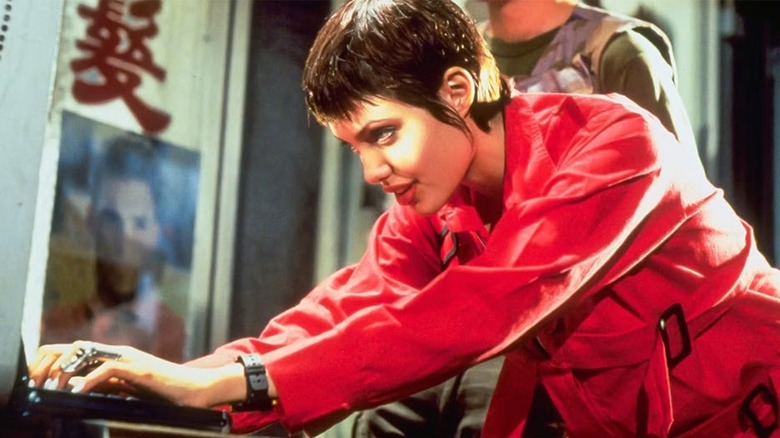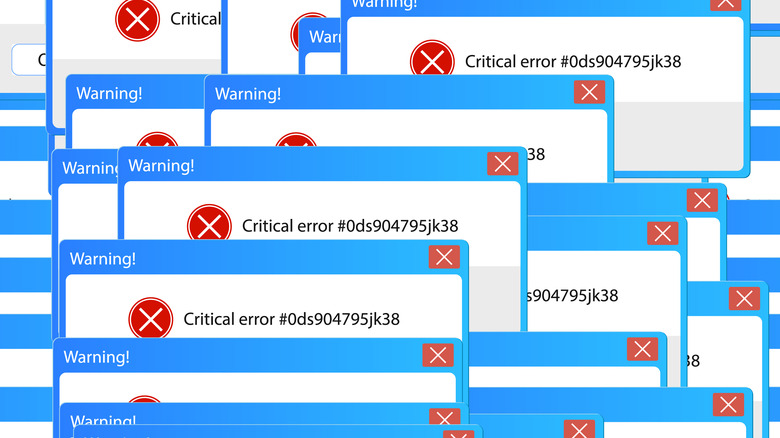5 Things Movies Always Get Wrong About Computer Hackers
Since the dawn of the technological age, the film and television industry has been mining the world of computers for narrative gain. While some tech narratives depict the industry in a relatively positive light, most tell tales of unchecked hubris and technology run amok. Somewhere along the way, a computer hacker invariably turns up to either help or hinder the central players, assuming they aren't the primary characters.
Such characters have, of course, developed a singular place in the modern cinematic landscape. As it was, 1983's "WarGames" essentially introduced the computer subculture to mainstream audiences, and dozens of films have explored hacker culture in the decades since. But even as that film's depiction of early hacker culture is regarded as pretty on point for what hacking was in the '80s, it's also a bit sensationalized because Hollywood never lets the facts get in the way of telling a more compelling story.
Likewise, even if more recent additions to the hacker subgenre like "Mr. Robot" and "A Murder At the End of the World" are more accurate in their depictions, they also can't help but play a little loose with the reality of hacker life, and they are not alone in that fact. Here are five things most movies and TV shows get wrong about hacking.
Hacking is not a precise art form
Perhaps one of the biggest tropes about hacking is that hackers always crack their mark on the very first try, and it's almost comically leaned upon in film and television shows that love scenes depicting a hacker saddling up to their computer and taking care of business with just a few keystrokes. Admittedly, those scenes tend to be pretty thrilling, and they're typically backed by up-tempo music designed to get the blood pumping, even though you're literally just watching a person bang away at a keyboard.
There are no doubt scenarios in which a well-versed hacker can break into a system with just a keystroke or two. But the reality of hacking is a far cry from that depiction and typically involves a lot of trial and error,if not a little straight-up guesswork. As for the guesswork, it's a big part of the equation because hackers don't always know what they're looking for when trying to break into a system. As such, they can spend considerable time searching for weaknesses in algorithms or source code. So even as fun as it can be to watch someone infiltrate a system in a few seconds a la "Hackers," Neo catching a few Zs in "The Matrix" as his computer runs code in the background is probably a bit more accurate.
Pop up windows are rarely a part of hacking
While we're talking about those fast-paced scenes in which a hacker breaks into a system with the speed of a sprinter, they frequently indulge in another genre trope, the perpetual pop-up screen. You know the routine; as one computer whiz or another plays attack or defense on their device, they do so while battling a gauntlet of pop-up windows presumably designed to foil their efforts.
It's easy to understand why filmmakers turn to the pop-up window tactic as hacking isn't all that interesting to watch, and representing the difficulty of a hack visually can be a challenge that even a banging techno beat can't overcome. However, real-life hackers like Samy Kamkar might tell you that they rarely, if ever, encounter such pop-up windows and instead spend much of their time looking at code and plain text.
Likewise, Kamkar notes all the fancy interfaces and 3D modules you see in many hacking scenes are almost entirely fictional. Perhaps more disappointing, Kamkar scoffs at the idea that anyone would go so far as to prank their mark by uploading cute videos of cats and dogs after hacking their system.
Simple hacks are often more effective than intricate ones
One of the more frequently indulged cinematic tropes concerning hacking is that only some super intricate hack will get one access to a system. That's understandable, as many of Hollywood's hacker-centric stories see them trying to infiltrate secure systems operated by government sites or world banking operations. But these days, most hackers want easy access to your devices and personal information. Instead of utilizing intricate code to attack users from the outside, many hackers are now trying to trick marks into granting access to secure systems so they can attack from the inside out.
Said approach is called social engineering, though it's also referred to as "human hacking." It's not unlike phishing or its whaling counterpart in that it involves hackers using psychological manipulation to exploit a mark's absentmindedness or trusting nature and get them to grant access to otherwise secure information and systems. Once in, they can wreak havoc by directly accessing private info, tracking potentially delicate internet activity, or installing malware and backdoor code that allows them to access the device even after the initial interaction.
Dangerous as it is, social engineering isn't quite as alluring from a storytelling front as the more traditional view of hacking, so it isn't often depicted in the film and television realms. But it can be every bit as devastating when it happens in the real world, and it requires very little work from hackers with nefarious goals.
Hackers don't type so fast when they're working
In many film and television tales fronting hackers, they are regularly shown attacking their work by typing with the fury of a wild animal defending its home from a predator. In some cases (we're looking at you, "NCIS"), that speed-typing trope is taken to legitimately absurd levels.
Yes, furiously typing can help convey the urgency of a situation, making it a very effective visual storytelling tool. Still, hackers rarely, if ever, find themselves in situations where typing at superhuman speed is necessary. More importantly, even as most hacks require a fair amount of patience from those doing the hacking, they also call for a certain level of precision. As such, any keystroke mistakes in their code could undermine the effectiveness of their attack or their defense depending on what side of the hack they are on.
Ultimately, the speed-typing hacker is yet another storytelling trope that filmmakers are forced to lean on to make the act of hacking more interesting for viewers. But most real-world hackers would tell you it's not the most effective way for them to go about their business.
Not all hacking is clandestine or illegal
As filmmakers have regularly dipped into the world of computer hackers to bolster tales of technological intrigue, they've often made low-key anti-heroes of hackers themselves. Despite this fact, much of the hacking seen in films like 2015's underrated thriller "Blackhat" is conducted mostly on the wrong side of the law, and that's in part because most real-world hacking is not strictly legal.
Just FYI, if you're wondering where that film got its title, the term black hat refers to hackers who use their skills almost exclusively for less-than-legal means. There is, however, an entire set of hackers dedicated to utilizing their skills for good. They're called white hat hackers, and they use those skills to help those at risk identify weaknesses in their security systems that could be exploited by the black hat set.
Of course, it's widely believed that many white hat hackers used to work on the other side of the legal divide, and it's safe to assume their first-hand knowledge of the black hat set is pivotal to how they approach preventing malicious attacks. But for the sake of entertainment, it's arguably more exciting to root for the anti-hero hackers of the world — even if the movies don't always get their world right.





